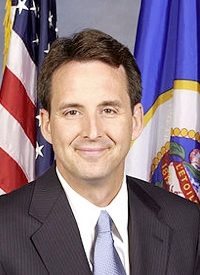
Most adults recall the iconic musical comedy, How To Succeed in Business Without Really Trying. It is still a mainstay of annual high-school plays, drama schools, and replays on classic-movie channels. The title speaks for itself, but the entertainment experience remains uproarious.
Over the past three months the Republican Party, the Tea Party, and conservatives activist organizations in general (even Libertarians) have produced their own adaptation on the theme — a dark comedy that would, in any other era be funny. While the tendency in politics to criticize one’s own smacks of treason, it is time for a reality check. Joseph Curl delivered one such critique in his April 10 piece for the Washington Times just ahead of Campaign 2012. He stated, in essence, that even publicity-hound Donald Trump knows more about strategic politics than the current “sad sack” cast of characters with their hat already in the ring. Or, sort of in the ring, depending….
To wit: Newt Gingrich (“perennial benchwarmer”), Tim Pawlenty (pictured above: “’milquetoast’ is too racy an adjective”), Mike Huckabee (last go-around’s third-place finisher), Rick Santorum (“who?”), Haley Barbour (“polls at just 1 percent”), Sarah Palin (with “negatives out-matching Newt Gingrich”), Rep. Michele Bachmann (“political lightweight”). He then produces a long list of dark horses with baggage but no ideas, and miscellaneous “hotshots” who can be counted on to take potshots instead of demanding the proverbial pound of flesh.
So, the question comes up: If one were a left-leaning political tactician, how would that person best provoke a general disinclination among potential voters to support conservative candidates, be they social conservatives, fiscal conservatives, foreign-policy conservatives or even liberal-leaning voters who suddenly are having second thoughts? What would be the best method of targeting all four categories in one fell swoop in an election cycle increasingly disenchanted with a socialist-leaning, overbearing government elite inhabiting federal, state and local agencies — not to mention the judiciary, whose preferred approach to criminal justice is targeting six-year-olds rather than tending to our borders or taking violent criminals permanently off the streets?
The best strategy leftists might employ to dim enthusiasm for conservative candidates would be to encourage a policy of non-responsiveness by conservative leaders to average voters. In other words, make it standard operating procedure for conservative leaders, legislators, organizational heads and columnists to ignore letters, e-mails, or any other attempts by average citizens to communicate with them, except by proxy (which is to say, “Lost in Space”).
Such a strategy is ever easier in the Era of Blog, when people are encouraged to vent — as long as it is solely to one another — leaving anyone in a position of leadership and influence above the fray, feeling no responsibility to respond, other than to fellow colleagues and occasionally to the press.
The ubiquity of the Internet has produced a curious mix — both an expectation of “connectedness” and disinclination toward face-to-face interaction. The advent first of e-mails, then texting, mass-distribution, Twitter, and Facebook has made in-person confrontation unnecessary, yet people still expect personalization — especially an individualized response to communications, given the apparent ease with which they can be created. This result is a dilemma, which entails creating multiple-choice “boilerplate” letters, one for every conceivable occasion, such that the first paragraph (usually one sentence) is tailored to leave space for the citizen’s name and issue at hand, and the rest offering feel-good pap and organizational, "canned" drivel. On-line, only names are inserted today; individuals must select from a drop-down menu of pre-selected issues.
It isn’t all that easy, of course, especially without staff. Because individuals no longer, as a rule, send snail-mail letters outlining their concerns, official offices and better-known individuals receive avalanches of daily communications via the electronic medium — more than were ever delivered by the old-style Post Office. So, while the task can be overwhelming for those without the ability to pay staff, with staff the job is not so time-consuming. Even so, the practice of non-responsiveness remains.
The means to monitor Americans’ concerns through polls and surveys is easier than ever before, making it easier for individuals who fancy themselves “famous” and “official” to ignore those who are not. Leftists are more apt to get around this problem using the faux-forum — a “packed” (and media-enriched) Town Hall meeting so as to appear interactive; whereas conservatives tend to rely on professional “handlers” to provide them a feel for “what the people want” and insulate them from the rest.
Thus do conservative leaders with an already-skewed view of constituent concerns (and their own popularity) brush off individuals who attempt to contact them — even some who head medium-to-large sized organizations in far-flung states. What they don’t realize is that the various ignored individuals and groups increasingly are “finding” each other via the Internet — thanks to mass-dissemination lists, YouTube, “Apps” and other new means of ever-morphing electronic contact.
This problem is frustrating the conservative base at precisely the wrong time in history. It threatens to unravel any stop-gap gains made in midterm and “special” elections. Thus shielded from the hoi polloi, they work their way into becoming household names and national leaders. The list includes some conservative columnists and once-approachable organizational leaders. They wind up antagonizing the very individuals who would support them.
Of course, there are always those willing to travel in vans and busloads, stand out in the rain and chant supportive slogans just to catch a glimpse of the “powerful” — and maybe garner a few “attaboys” and “thank-you’s.” But a bevy of vans or busloads today does not energize a nation, especially in a climate of liberal-leftist media coverage. What’s more, the financially well-endowed and Type-A executives and administrators not caught up in the political rat-race are not going to be among the enthusiasts waving signs, chanting slogans, and wearing plastic rain-garb.
Bottom line: Conservatives have failed to comprehend new media gimmicks. They understand the appeal of websites and include tabs to “Contact Me,” but they do not understand what it takes to actually “connect” in that environment, nor do they care to. Instead, they’re doing what Boomers’ parents used to call “cutting off your nose to spite your face.”
Their websites tend to place the reader/viewer into a closed-loop trap from which there is no escape — typically used for data-gathering and fund-raising letters. Many conservatives are beginning to “get it” and are expressing frustration with the practice, beginning with the demand for registration once one has clicked on “Contact Me.” Even seasoned professionals have complained of spending hours attempting to track down the addresses or phone numbers for heads of conservative organizations listed under “Contact Me.” Of course, if it’s a speaker one wants, they reach PR staff, not the organization’s head or columnist.
Examples of "unapproachable conservative leaders" are too numerous to list, but here’s a sampling: The heads of the three primary Tea Party organizations: Judson Phillips, Tea Party Nation; Amy Kremer, Tea Party Express; Mark Meckler, co-founder Tea Party Patriots. There are the heads of supposedly media-savvy organizations such as Ed Fuelner of The Heritage Foundation; Beverly LaHaye and Janet Crouse of Concerned Women for America fame; conservative columnists such as Michelle Malkin and Jeffrey Kuhner (all having become “fellows” of some prestigious organization, meaning they get a paid-for address there and their names on a roster); R. Emmett Tyrrell, Jr., Editor-in-chief, The American Spectator; Jonathan Garthwaite, the ever-faceless editor-in-chef of Townhall, which boasts celebrity columnists and speakers; Grover Norquist, president of Americans for Tax Reform; Minnesota Republican and Tea Party favorite, Rep. Michele Bachmann, among most other federal and state legislators and governors. A few candidates have even brushed off potentially big donors of influential organizations, such as those heading arts and cultural foundations alarmed about the downward caliber of art and entertainment, and whose contacts include even more endowed donors.
You get the picture.
What happens is that individuals who read and listen to these saner conservative voices work up a laudable go-get-’em resolve and vigor — and then find the door locked, so to speak, unable to ask so much as a simple question of their organizational directors and managers.
Time was, as late as 1986, that the late President Ronald Reagan would pen handwritten notes to struggling conservative supporters, respond extensively to their exact questions, advise them on issues within his sphere of influence, and annotate helpfully the writings of up-and-comers to suggest improvements. He had his staff send hand-written, personalized Christmas cards to someone who may merely have said something nice about him in a non-syndicated column somewhere out in the boondocks. This author should know; she received them all at one time or another between Mr. Reagan’s governorship in California and presidency in Washington, and a then-ingenue named Peggy Noonan revealed in her first book how President Reagan red-lined her early speeches for him, without any snide remarks or putdowns. By contrast (irrespective of specific political beliefs), today’s conservatives behave more like Simon Cowell, formerly of American Idol, not the Class Act, Ronald Reagan.
There is, of course, a place for registration to qualify for posting blogs and comments — to weed out the proverbial nut-cases, the potential security threat, spam and phishing and what many call “permanent pen-pals.” This author has received them all, and so have most newspaper and magazine editors, organizational chiefs and legislators. But the fact remains that sometimes there is a really good “egg” mixed in with the rabble, that key individual who comes up with an idea or information that could change the course of a campaign or issue. But will these potentially valuable supporters be able to make personal contact and offer their wares?
Also, we have just seven months before the active campaign season begins in which to get our collective, conservative act together and turn this nation around.
If some columnists (this author included) can respond personally to some 200 e-mails a day without staff (albeit in the wee hours in many cases), leaders with staff can, and should, do better.
Many American voters are beginning to balk — in letters to the editors, in blogs (of course) and in e-mails to columnists who actually read and respond to queries. But more are noticeable by their absence — at fundraisers and rallies. This should serve as a clear warning that off-putting dismissals are not a formula for turning the encroaching American socialist-authoritarian state, which is becoming ever more entrenched.
Failure by mainstream conservative groups to heed common-sense good manners speaks to a massive cluelessness regarding political tactics and strategy. The fact is, there exists a virtual army of activists who gave up perfectly good jobs in the late 1990s and early 2000s to devote themselves to the work of turning America around and putting what little they subsequently made back into the cause. Examples include Roni Sylvester Bell, chair and former president of Land and Water USA; Ron Ewart, president of the National Association of Rural Landowners Association; Michael Shaw, president of Freedom Advocates; Mark V. Trostel, Chairman, Good Neighbor Law; Michael Coffman, president of Environmental Perspectives, Inc.; Tom DeWeese, founder and president of the American Policy Center, and hundreds more. Most are prolific writers, have produced best-selling DVDs on issues such as energy, education, and "sustainable development," and several have Ph.D.s in their field. All have hundreds, if not thousands, of fans and followers who would jump at the chance to support a candidate with guts, knowledge, integrity, dedication, and charisma.
Unfortunately, most of the “mainstream” conservative movement is focused only on charisma — of the loud and noisy variety — the kind that can garner $20,000 per speech, but offer primarily acerbic gibes, and little new in the way of information and ideas.
Maybe that’s why people jumped out of their seats at the Conservative Political Action Conference (CPAC) when Donald Trump took the podium. Perhaps they thought, if nothing else, that maybe “the Donald” would surround himself with outside-the-box thinkers instead of “yes-men” (and women), behave proactively, and above all, be responsive whenever the fire hits the fan — the kind that brings not just a room, but a nation, to its feet.
Trump may have missed the mark when it comes to offering sound constitutional solutions, but, as Joseph Curl observed, his strategic game plan and personal presentation might be employed by others who are closer to the constitutional bull’s eye, but are P.R.-challenged.
_________
Beverly K. Eakman is a former speechwriter for the heads of two federal agencies, a sought-after lecturer and the author of five books (including the best-selling, international award-winner, Cloning of the American Mind: Eradicating Morality Through Education) on education policy, mental-health and illicit data-trafficking. Her latest work is Walking Targets: How Our Psychologized Classrooms Are Creating a Nation of Sitting Ducks. Her seminar manual, How To Counter Group Manipulation Tactics, just came out in its 2011 Edition, 5th printing. She can be reached through her web site: www.BeverlyE.com.



